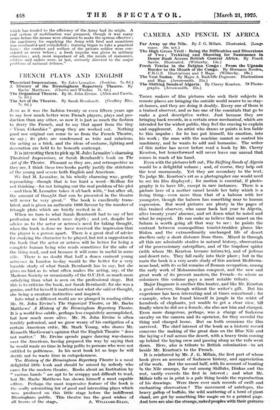FRENCH PLAYS AND ENGLISH
JUST as it was the fashion twenty or even fifteen years ago to say how much better were French players, plays and pro-
duction than any other, so now it is just as much the fashion to decry the French, and to say that apart from the tiny Vieux Colombier " group they are worked out. Nothing good nor original can come to us from the French Theatre, we say ; its plots are condemned as trite and salacious, the acting as a trick, and the ideas of costume, lighting and decoration are held to be beneath contempt.
It is interesting then to pick up M. Jules Lemaitre's charming Theatrical Impressions, or Sarah Bernhardt's book on The Art of the Theatre. Pleasant as they are, and retrospective as they are, I think these two books partly justify the strictures of the young and severe both English and American.
We find M. Lemaitre, in his wholly charming way, gently reproaching—though that is too hard a word—Meilhac for not thinking—for not bringing out the real problem of his plot —and then M. Lemaitre takes it all back with, " but after all, the amount of thoi4;ht that can be presented in the theatre
will never be very great." The book is excellently trans- lated, and is given an authentic 1880 flavour by the number of triangle plots which are briefly recited in it.
When we turn to what Sarah Bernhardt had to say of her profession we find much more depth ; and yet, despite her advice as to the actor or actress's need for taking thought, when the book is done we have received the impression that the player is a person apart. There is a great deal of advice for studying the character to be played, but not a suggestion in the book that the actor or actress will be better for being a complete human being who reads sometimes for the sake of the thing read, and not because it will come in useful in some
role. There is no doubt that half a dozen eminent young actresses in London to-day would be the better for a very humble study of what Sarah Bernhardt has to say, but she
gives no hint as to what often makes the acting, say, of the Marlowe Society or occasionally of the O.U.D.S. so much more satisfying than what is seen on the professional stage. But this is to criticize the book, not Sarah Bernhardt, for she was a genius, and for herself it mattered not what she said or thought, she being a creature instinctive and inspired.
Into what a different world are we plunged in reading either Mr. St. John Ervine's The Organized Theatre, or Mr. Bache Matthews' A History of the Birmingham Repertory Theatre.
It is a world less subtle, perhaps less exquisitely accomplished, but how much more alive. Mr. St. John Ervine is often
terribly polemical, and we grow weary of his castigation of a certain American critic, Mr. Stark Young, who shares Mr. Kenneth MacGowan's opinion that the English Theatre " does
not matter." Mr. Ervine spends pages dancing war-dances over the American, having prepared the way by saying that he would waste no time in being polite to persons who were not entitled to politeness. In his next book let us hope he will decide not to waste time in outspokenness.
The History of the Birmingham Repertory Theatre is a most delightful little book and should be missed by nobody who cares for the modern theatre. Books about an Institution by " various hands " are apt to be scrappy and difficult to read, but Mr. Bache Matthews has shown himself a most capable editor. Perhaps the most impressive feature of the book is the really astonishing list of good and interesting plays which were produced on this little stage before the indifferent Birmingham public. This theatre has the good wishes of






















































 Previous page
Previous page